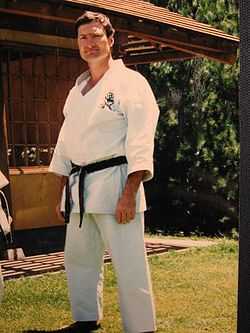Paul Starling
| Paul Starling | |
|---|---|
|
Paul Starling at the Japanese Prisoner-of-War Memorial in Cowra, New South Wales | |
| Born |
1948 Sydney, Australia |
| Residence |
|
| Style | Karate |
| Rank | 7th dan karate |
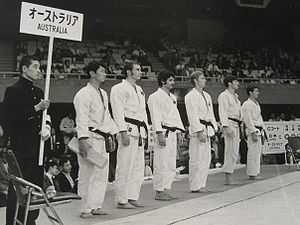
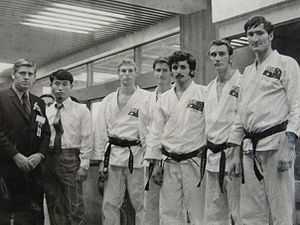
Paul Noel Starling (born 1948) is an Australian martial artist renowned as a Gōjū-ryū Karate master. He was the most senior Caucasian student of Gōjū-ryū Grandmaster Gogen Yamaguchi Kaiso, and a world Vice President of the International Karate do Goju Kai Association (IKGA)[1]
Karate World Championships
He was also the first Australian Karateka to compete in a Karate World Championships and remain undefeated when in 1970 at the very first Karate World Championships his team came up against undisputed favorites Japan at the inaugural event held in Tokyo Japan.[2] Paul Starling was also the very first graduate (1973) of Gogen Yamaguchi's elite Japan Karate do College, and the only Caucasian & Australian to graduate as a Shihan (Master).[3] He commenced training as a teenager in 1963 at the very first Dojo (karate school) of Goju Kai established in Australia at that time, with the founder of Goju Kai in Australia; Merv Oakley Sensei.[4][5] During this period in Australian Karate do history there were very few qualified Instructors in the country,[6] and of those only a handful were proficient or graded legitimately to Instructor level.[7] Merv Oakley was a pioneer of Australian Karate, and was the first Australian to have traveled to the Nippori, Uneo and Asakusa Tokyo Dojo in Japan to study and train with Gogen Yamaguchi Hanshi for extended periods of time.[8]
Daily Training Regime
Starling had commenced training on a daily basis in Judo from adolescence with a very distinguished Australian teacher; Sensei Ron Cox, who trained with Australia's Olympians Peter Paige; Brian Dalton and Ron Foord,[8] and for a decade continued to train in Judo, where he was a junior Youth Champion,[9] and Goju Kai Karate do concurrently and on a full time daily basis with both disciplines. In those days like other enthusiastic young karate-ka, Starling commuted large distances from home via public transport in order to train with the most highly qualified teachers in Sydney.
After graduation from the elite Barker College in Sydney with the Leaving Certificate, Paul was recruited by Unilever Australia who supported his world championship participation 1970- 1972 [10] where he commenced a managerial trainee-ship whilst he simultaneously commenced duties with the Australian Army CMF, following in the footsteps of his career Army man father: Lieutenant Colonel Noel George Reid Starling, who it is argued was the longest serving Australian Army Officer, (46 years) enlisted 1927- 1973.
Early years
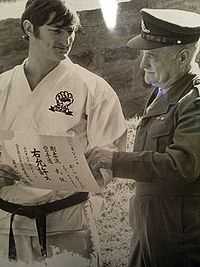
It was as an Australian Army officer himself that Paul Starling developed his early leadership skills and the self discipline that helped him build the reputation of Gōjū-ryū via the Sydney Goju Kai Dojo and the Macquarie University Karate Club, into successful traditional Japanese Dojo. As a founder and executive member of the Australian Karate Federation,[11] for many years he was involved in a voluntary capacity for over two decades in promoting Karate do in Australia and as a referee, judge and coach at State, National and International W.K.F. competitions.[12] Along with Australian politician and fellow karateka, the late John Newman, he promoted Australian Karate do in the media and helped to organise colleague Instructors in Australia in those fledgling days, into a cohesive group whereby Australia's reputation and success at International competition during the 1980s was unprecedented for a country with such a limited population.[13]
As a member of the very first Australian team to the Karate World Championships (World Karate do Championship), and the only member to remain undefeated,[14] the Australian team of five John Halpin; Paul Starling; Graham Kelleher; Danny Ellaby and Ilias Zacharias came up against world favorites- Japan. Photos to the right show the team members about to compete against the Japanese team at this historic event. Paul Starling remained unefeated against his opponent; the highly respected All Japan Champion Akihita Isaka.[15] Japan were the eventual winners of the coveted World Championship Team event.[16] Other members of the Japanese World Champion team included: Abe, Yahara, Osaka, and Tanaka.
Contributions to karate
- Represented Australia at the Karate World Championships World Karate Federation's first Karate World Championships in Japan in 1970, and also at the 2nd Karate World Championships at Paris in 1972.
- A founder member of the Australian Karate Federation
- A.K.F. the only recognised body by the Australian Government and the International Olympic Committee.
- Founder member -The Kokusai Karate do Shihan Kai.
- Founder member -The New South Wales Karate Federation.
- Chief Instructor - Macquarie University Karate Club. (1971–2004)
- Represented Australia as an international official at W.U.K.O (W.K.F.) Karate World Championships
- Karate Instructor of the Year (Blitz Magazine)
- Chancellor's Lifetime Achievement Award- Macquarie University
- First Shihan graduate of Gogen Yamaguchi Kaiso's Japan Karate do College Nihon Karate do Senmon Gakko
- Only Caucasian and Australian Graduate as Shihan: Japan Karate do College [17]
Coolangatta Gold
Starling's role as the Karate-do instructor in the 1983 classic[18] Australian movie The Coolangatta Gold[19] also known as Lucas Lucas in Asia, and The Gold and the Glory in the United States.[20] accompanied by several of his black belt students who played the part of the Karate class. Starling was approached by the film's producer, director and writer (Igor Auzons and Peter Schreck) in 1982 and asked to train a leading actor, Joss McWilliam, in karate methods full time over a period of 3 months in order for the actor to fulfill his role in the film.[21] McWilliam trained diligently as a beginner on a daily basis with Paul and the senior instructors of the Dojo. His character in the film was a black belt Shodan; however, in reality, McWilliam was actually a white Belt in Karate do. Starling was chosen from Australia's most elite karate-do athletes to portray the Karate Instructor in this classic Australian movie 'The Coolangatta Gold in 1983, by producer John Weiley; director Igor Auzins and writer Peter Schreck, whereby Starling was noted by the reviewers of respected American Variety (magazine) as having played a most commendable and convincing role.[22]
Training at the Japan Karate Do College
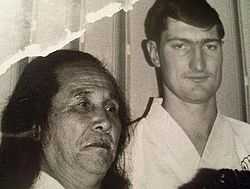
Whilst in Japan and attending the prestigious Japan Karate do College,[23] Starling had stayed with Gogen Yamaguchi Hanshi in his home, and had also acted in a secretarial capacity for the I.K.G.A. (International Karate do Gojukai Association). In this role he had become very closely aligned with the Yamaguchi family in Japan,[24] and he has since returned on a dozen different occasions with very large groups of his students[25] to train with both Gogen Yamaguchi Hanshi prior to his death in 1989, and also later with Goshi Yamaguchi Shihan, Gosen Yamaguchi Shihan, and also Wakako Yamaguchi Shihan.
Whilst at the Japan Karate do College (Nihon Karate do Senmon Gakko) where Starling trained full time for one year in 1973, he was taught by Grandmaster Gogen Yamaguchi (Goju Kai), Grandmaster Hironori Otsuka (Wado Ryu), Grandmaster Iwata Manzao (Shito Ryu), Grandmaster Tamae (Rembukan), and Grandmaster Gansho Motokatsu Inoue (Ryukyu Kobujitsu Hozon Shinko Kai). Also trained by Goshi Yamaguchi Saiko Shihan, and several other Japanese Shihan of the time.[26]
When in Tokyo 3 years previously during 1970 whilst representing Australia in the Team kumite event at the inaugural Karate World Championships, Gogen Yamaguchi suggested the name of Sydney Goju Kan for Starling's own Dojo, and the School has been in operation ever since. Along with the Macquarie University Karate Club (established 1970) Sydney Goju Kai members of Paul Starling Shihan trained with, and competed against their Melbourne Goju Kai colleagues. It was in 1989 that Paul Starling Shihan became the Chief Instructor of Goju Kai Karate do Australia until retiring from that position 15 years later in 2004 due to a sudden illness.
Accomplishments
- Former N.S.W State Coach for the New South Wales Karate Federation.
- State of New South Wales "A" Level Referee Australian Karate Federation.
- Former "A" Level National Australian Referee for the Australian Karate Federation.
- Former National Secretary for the AKF (FAKO).
- Represented Australia as a referee/judge various Karate World Championships World Karate Federation Championships including Taiwan 1982,[27] where he coached his wife and student (Sandie) Alexandra Starling Shihan to become the first ever Australian Karate athlete to win a medal, when she won 3rd place: Bronze in the Karate World Championships Female Kata event performing Gōjū-ryū Kata Seisan, Seipai and Suparinpei.[28][29][30]
- Formulator of inaugural Level One Coaching Course run by the A.K.F. for the National Coaching Accreditation Scheme.
- On the committee that designed the original Level Two Coaching Scheme for the A.K.F.
- National Australian University Sports Co-ordinator for Karate do.
- Organizing Committee: Karate World Championships W.K.F. World Karate do Championships Sydney 1986.
Legacy
Many international, Australian national, and state karate champions have come from Starling's dojo.[31] Many of his students have gone on to become internationally recognised instructors in their own right. Amongst his senior graduates who have gone on to become shihan are Ingo De Jong 8th dan hanshi[32] (I.K.G.A. Vice President, Director of the European Bloc, Branch Chief for Scandinavia),[33] Helmut Moldners 5th dan Renshi (former NSW North Coast Branch Chief), Mark Burton 6th dan Renshi (N.S.W. Branch Chief and Chief Instructor) and Sandie Alexandra Starling 5th dan Renshi W.K.F World Karate do Championship Taiwan medalist in 1982.[34]
Current I.K.G.A. qualifications
Paul Starling was awarded KYOSHI License in 1989 by Gogen Yamaguchi and Saiko Shihan Goshi Yamaguchi, 7th Dan in 1995 in Tokyo Japan, and was also graded to 5th Dan in the Okinawan Weapons Ryukyu Kobujitsu Hozon Shinko Kai in 1988 by Grandmaster (Gansho) Motokatsu Inoue in Shimizu City, Shizuoka Prefecture, Japan. Starling's most senior student has been training with him for 39 years: Dr Mark Burton 6th Dan Renshi Shihan, former Australian & New South Wales Kata Champion, is now the New South Wales Branch Chief and Chief Instructor for Goju Kai Karate do Australia Sydney Goju Kan.
References
- ↑ I.K.G.A. Headquarters Tokyo Japan: English Version http://www.karatedo.co.jp/goju-ryu/index.html
- ↑ Full Coverage Inaugural World Karate do Championship.,Tokyo Japan,in Australasian Fighting Arts Magazine.,Autumn edition 1970
- ↑ A.T.N. Channel Seven Australia News., 23 December 1973.
- ↑ Australasian Fighting Arts Magazine Summer 1985 Issue
- ↑ National Archives of Australia., All Issues Available :http://nla.gov.au/nla.cat-vn1779838
- ↑ http://www.karategojukai.com/Karate.php
- ↑ Australasian Fighting Arts Magazine., reporter & Ed. Kevin Brennan, December 1974
- ↑ 8.0 8.1 Yamaguchi Gogen., Karate Gojū-ryū by the Cat. 1963 Rapid Print Co. Ltd Tokyo, Japan
- ↑ New South Wales Junior Youth Champion Open weight division,RSL- 1965.
- ↑ Undefeated Aussie., in Unilever Reporter November 1970
- ↑ Kevin Brennan., Ed. Australasian Fighting Arts Magazine Summer Edition 1971
- ↑ Karate Shinbun Official publication of Australian Karate Federation issues 1971-1990
- ↑ http://www.akf.com.au
- ↑ A.T.N. Channel Seven Australia News, 23 December 1973
- ↑ Akihita Isaka Biography cited at:http://www.theshotokanway.com/isakaprofile.html
- ↑ http://www.karaterec.com/en/contests/world-championship-1970/
- ↑ A Crash Course at the College of Hard Knocks: Black Belt Magazine-Rainbow Publications U.S.A. 1973
- ↑ The Coolangatta Gold: http://www.imdb.com/title/tt0087085/
- ↑ http://www.film.com/celebrities/paul-starling/14630252
- ↑ Released worldwide distributed in Australia by Hoyts Distributions
- ↑ Variety Magazine cast online
- ↑ Variety Magazine Film Review., The Coolangatta Gold, October 1985
- ↑ A Crash Course at the College of Hard Knocks: Black Belt Magazine-Rainbow Publications U.S.A. 1973
- ↑ A.T.N. Channel 7 Australia News 23 December 1973
- ↑ Sydney Morning Herald article 'The Way of the Empty Hand: A Master Tells the Truth About Karate..Paul Starling, by special reporter David Myton.,dd//mm/ p.p1976
- ↑ A Crash Course at the College of Hard Knocks: Black Belt Magazine-Rainbow Publications U.S.A. 1973
- ↑ Australia brings home medal to Starling's nest., cited in Hornsby and North Shore Advocate, 16 November 1982
- ↑ Australian Karate Federation A.K.F.
- ↑ http://www.gojukai.com.au/Alexandra_Starling_Shihan.html
- ↑ World Karate do Records cited at: http://www.karaterec.com/en/contests/world-championship-1982/
- ↑ Goju Kai Karate do Australia http://www.gojukai.com.au
- ↑ De Jong, Ingo.,Goju-Kai Karate-do Hard and Soft in Harmony Sweden, Preface & Dedication; Jakobsbergs Tryckeri, (1989).
- ↑ International Karate do Goju Kai Scandinavia http://www.gojukai.se
- ↑
